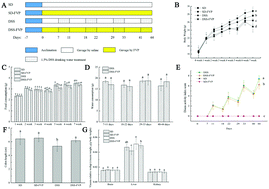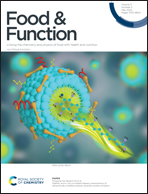Effects of a β-type glycosidic polysaccharide from Flammulina velutipes on anti-inflammation and gut microbiota modulation in colitis mice†
Abstract
Using the Flammulina velutipes polysaccharide (FVP) extracted from our previous study, herein, we investigated the improvement of this starch-free β-type glycosidic polysaccharide in alleviating dextran sodium sulfate-induced ulcerative colitis (UC) in mice. The absolute and relative abundance of intestinal microbes in the mouse feces were both determined by 16s RNA gene sequencing. The results from the histological analysis indicate that FVP treatment reduced the symptoms of UC, up- or down-regulated the relative gene expression levels in the colon tissue, and enhanced the capacity of metabolic and biogenesis in the UC mice, as predicted by PICRUSt. 11 species of gut microbes including Lactobacillus, Bifidobacterium, and Clostridium associated with UC symptoms were analyzed by correlation analysis. Our findings suggest that FVP can alleviate the UC symptoms in mice by regulating specific gut microbes, improving the understanding of the functional activity of FVPs as prebiotics.



 Please wait while we load your content...
Please wait while we load your content...